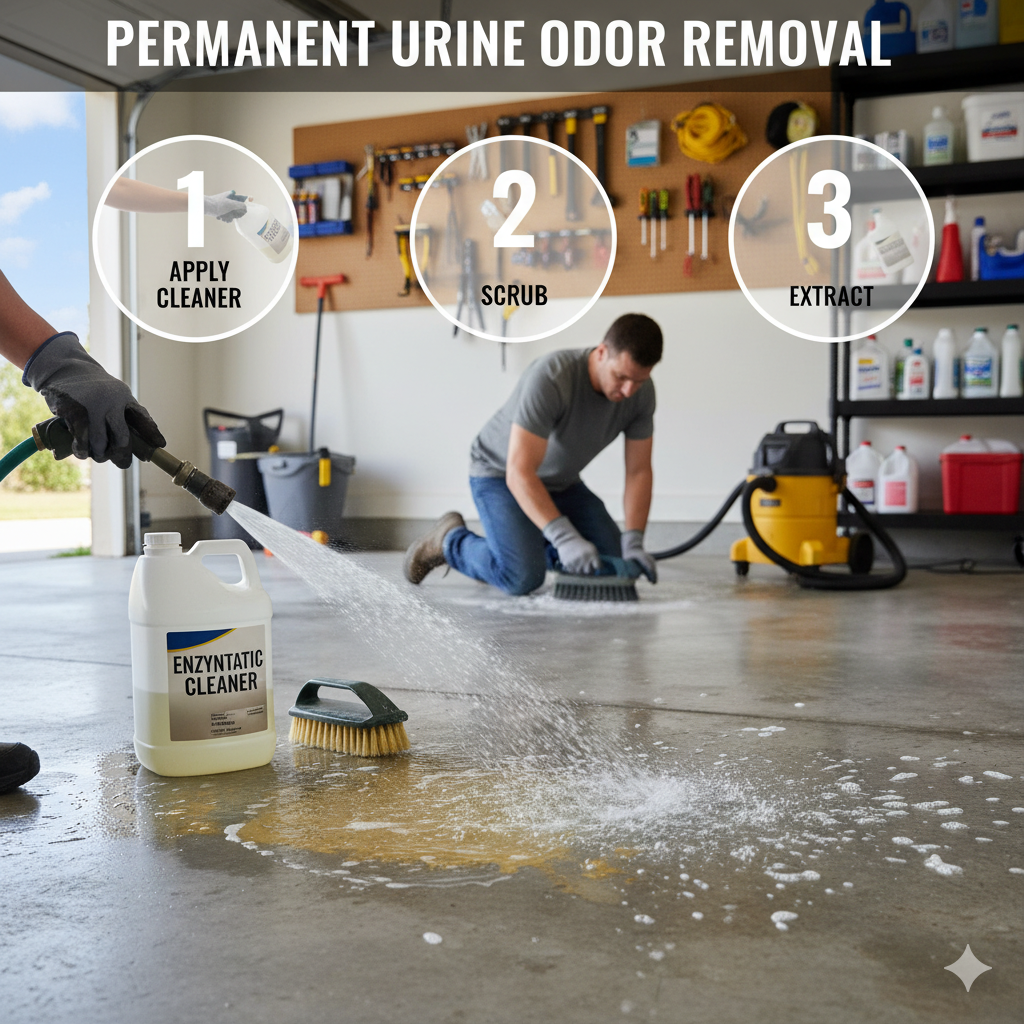If you’ve ever owned a dog or cat, you know how frustrating pet urine odors can be—especially when they soak into concrete floors, garages, patios, or basements. Concrete is porous, which means urine seeps deep inside its tiny holes, leaving behind bacteria, uric acid crystals, and a lingering foul smell that reactivates every time the surface gets damp.
The good news? You can remove urine smell from concrete permanently not just mask it. In this comprehensive guide, you’ll learn how to clean, deodorize, and seal your concrete floor using TSP (trisodium phosphate) and enzymatic cleaners the two most effective methods recommended by cleaning experts.
Why Concrete Holds Urine Odor
Concrete might look solid, but under a microscope, it’s filled with thousands of tiny pores. When pets urinate on it, the liquid soaks deep into these pores and hardens into uric acid crystals. Ordinary soap, bleach, or vinegar can’t dissolve these crystals; instead, they just cover up the smell.
Whenever humidity rises or you mop the floor, the moisture reactivates those crystals, causing the odor to return. To permanently eliminate it, you must deep-clean, neutralize, and enzymatically break down the residue.
Quick Overview: How to Remove Urine Smell from Concrete
-
Sweep and clean away all dirt and debris.
-
Mix ½ cup TSP with 1 gallon of hot water.
-
Scrub the mixture into the concrete and let it sit for 5–10 minutes.
-
Rinse thoroughly and vacuum up the liquid.
-
Let it dry overnight.
-
Apply an enzymatic cleaner generously.
-
Let the cleaner soak overnight to break down uric acid.
-
Rinse, dry, and seal the concrete to prevent future odor.
🧼 Step-by-Step Guide: Remove Pet Urine Smell from Concrete
1. Prepare and Clean the Area
Remove furniture, rugs, or obstacles from the surface. Vacuum or sweep away dirt, pet hair, and dust.
Cleaning specialist Regina DeCorte recommends scrubbing the concrete with hot, soapy water and a stiff bristle brush to remove residues before applying any cleaners. A clean surface allows the chemical solutions to penetrate deeply rather than pushing grime further into the pores.
2. Find the Urine Stains
If the smell seems stronger in certain spots, you can pinpoint urine locations using a UV (blacklight) flashlight. Turn off the lights, hold the UV light 1–3 feet above the floor, and look for glowing yellow, green, or blue stains. Mark these spots with chalk.
Even if only part of the floor glows, it’s best to treat the entire surface so that you don’t miss hidden stains.
3. Deep-Clean with TSP Solution
TSP (trisodium phosphate) is a heavy-duty degreaser that breaks down organic waste and prepares the surface for enzyme treatment.
-
Mix ½ cup of TSP per 1 gallon of hot water.
-
Wear rubber gloves and goggles for safety.
-
Pour or spray the mixture onto a 3x3-foot section of concrete at a time.
-
Scrub the surface thoroughly with a stiff brush and allow it to sit for 5–10 minutes.
If the mixture begins to dry, re-wet it to ensure maximum penetration. As it reacts, you may notice a stronger urine smell—this is normal, as the TSP reactivates uric acid crystals.
💡 Eco-friendly alternative: You can use a 2:1 vinegar-to-water mixture, but note that vinegar usually only masks the odor temporarily.
4. Rinse and Let the Floor Dry
After scrubbing, pour hot water over the area and use a wet/dry vacuum to remove all the liquid. Rinse twice more with clean water, then let the surface air-dry overnight.
Avoid using fans the goal is slow drying, which helps lift out any remaining residue.
If your vacuum begins to smell, run an enzyme solution (1 part cleaner to 30 parts water) through its hose and tank to neutralize odors.
5. Apply an Enzymatic Cleaner
Enzymatic cleaners contain live bacteria that feed on and break down uric acid crystals—the root cause of lingering urine smells.
Before applying, ensure the floor is completely dry from pre-cleaning. Pour or spray the cleaner generously, saturating each section until it stays visibly wet for at least 10 minutes. For severe stains, scrub gently to help the solution penetrate deep into the pores.
Popular options include Nature’s Miracle, Simple Solution, and Rocco & Roxie Professional Strength enzyme cleaners.
Allow the enzyme solution to sit overnight under a plastic tarp to slow evaporation and give the microbes time to digest odor-causing compounds.
6. Rinse and Repeat if Necessary
After 12–24 hours, remove the tarp and let the floor dry naturally. If odors persist, re-apply the enzymatic cleaner to heavily soiled areas. Some deep stains require 2–3 treatments before the smell completely disappears.
7. Seal the Concrete
Once the smell is completely gone, apply a concrete sealant to prevent future urine absorption.
Sealing not only blocks moisture and odors but also enhances the color and longevity of your floor. Follow the sealant manufacturer’s directions for the best results.
Landscaper Tony Hoang notes that sealing “creates a thin, protective layer between spills and the concrete,” helping resist stains and extend its lifespan.
8. Natural Odor-Neutralizing Alternatives
If you prefer natural methods, you can sprinkle baking soda on the area and let it sit overnight to absorb residual odors. Or leave bowls of white vinegar around the room cleaning expert Kadi Dulude says vinegar temporarily absorbs and removes lingering smells from the air.
However, these are short-term fixes; for a permanent solution, always finish with an enzymatic cleaner and sealant.
9. When to Hire Professionals
If you’ve tried multiple cleanings but the odor keeps coming back, it may have penetrated too deeply. Professional cleaners use industrial-grade enzyme treatments and steam extraction machines that reach deeper layers of concrete—saving you time and frustration.
Real-Life Success Stories
-
Deb H., a foster dog parent, said: “After reading this guide, we used TSP followed by enzyme cleaner and finally sealed the concrete. The smell that haunted us for months disappeared completely.”
-
Rob W. shared: “Sprinkling carpet powder overnight before enzyme treatment released deep-set odors. My basement finally smells fresh.”
-
Marge W. added: “I learned why moisture reactivates urine smells understanding the science helped me treat it right.”
Final Thoughts: Get Rid of Urine Odor from Concrete for Good
Pet urine smell doesn’t have to be permanent. With the right products and techniques TSP pre-treatment, enzyme cleaning, and sealing—you can restore your concrete floor to a fresh, odor-free state.
Commit to deep cleaning rather than surface wiping, and your concrete will stay clean, sanitary, and safe for your family and pets.



